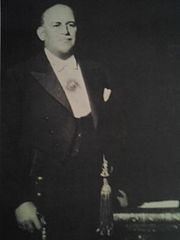Agustín Justo
| Agustín P. Justo | |
|---|---|

President Agustín P. Justo
|
|
| President of Argentina | |
|
In office February 20, 1932 – February 19, 1938 |
|
| Vice President | Julio A. Roca, Jr. |
| Preceded by | José Félix Uriburu |
| Succeeded by | Roberto M. Ortiz |
| Personal details | |
| Born |
February 26, 1876 Concepción del Uruguay, Entre Ríos |
| Died | January 11, 1943 (aged 66) Buenos Aires |
| Nationality | Argentine |
| Political party | Concordancia (UCR-A, PSI, PDN) |
| Profession | Military |
| Military service | |
| Service/branch | Argentine Army |
| Years of service | 1892–1931 |
| Rank | Major General |
Agustín Pedro Justo Rolón (February 26, 1876 – January 11, 1943) was President of Argentina from February 20, 1932, to February 20, 1938. He was a military officer, diplomat, and politician, and was president during the Infamous Decade.
Appointed War Minister by President Marcelo Torcuato de Alvear, his experience under a civilian administration and pragmatic outlook earned him the conservative Concordance's nomination for the 1931 campaign. He was elected president on November 8, 1931, supported by the political sectors that would form shortly after la Concordancia, an alliance created between the National Democratic Party (Partido Demócrata Nacional), the Radical Civic Union (Unión Cívica Radical) (UCR), and the Socialist Independent Party (Partido Socialista Independiente). Around the elections there were accusations of electoral fraud, nevertheless, the name patriotic fraud was used for a system of control established from 1931 to 1943. Conservative groups wanted to use this to prevent any radicals from coming to power. During this period there was persistent opposition from the supporters of Yrigoyen, an earlier president, and from the Radical Civic Union.
The outstanding diplomatic work of his Foreign Minister, Carlos Saavedra Lamas, was one of the greatest accomplishments of his administration, stained by constant accusations of corruption and of delivering the national economy into the hands of foreign interests, the British in particular, with whom his vice-president Julio A. Roca, Jr. had signed the Roca-Runciman Treaty. His name was mentioned as a candidate a new period during the unsteady government of Ramón Castillo, but his early death at 66 thwarted his plans. He worked on a preliminary study for the complete works of Bartolomé Mitre, whom he admired profoundly.
...
Wikipedia
